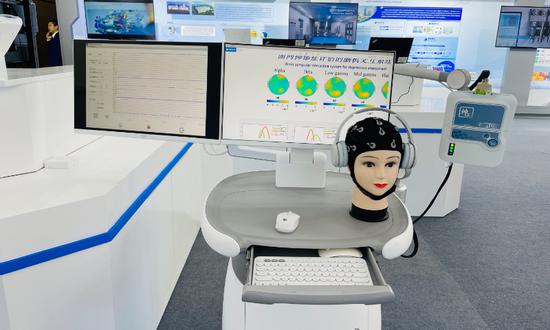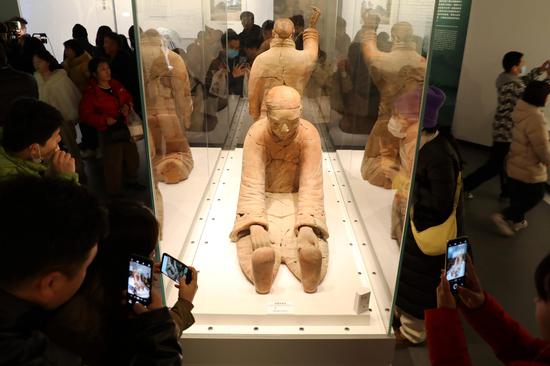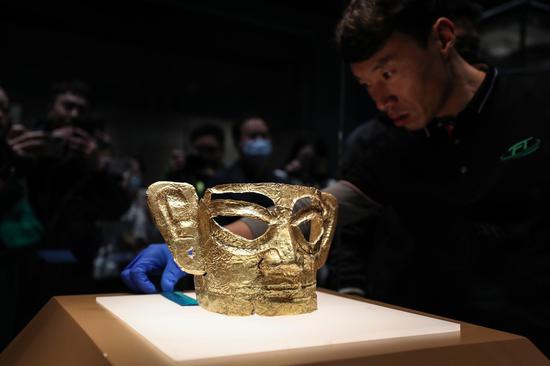
A brain computer interface (BCI) system is on display at the 2023 World Intelligence Congress in Tianjin on May 18, 2023. (Photo: Chi Jingyi/GT)
China has rolled out an ethical guideline for brain-computer interfaces (BCI) aiming to better guide the compliant development of BCI research and prevent ethical risks in the process of research and technological applications.
The released guideline by the Ministry of Science and Technology comes after Tesla CEO Elon Musk announced the success of a procedure to implant Neuralink's brain chip into the first human patient.
This guideline, compiled by the artificial intelligence ethics subcommittee of the National Committee for Science and Technology Ethics, released by the Ministry on Friday, serves as a reference for scientific research institutions and researchers.
It outlines the basic principles to be followed in conducting BCI research which are safeguarding health and enhancing well-being, respecting subjects involved and apply the technology on them moderately, adhering to fairness and ensuring equity, risk management and ensuring safety, information disclosure and ensuring informed consent, supporting innovation and strict regulation.
For rare diseases that seriously endanger life and have no other effective treatment methods, clinical trials of innovative BCI products can be conducted with full informed consent under strict compliance with national regulations on medical devices and clinical research, the guideline pointed out.
The guideline highlights that research that replaces or weakens human judgment and decision-making abilities, significantly interferes with or blurs human autonomy and self-awareness should be avoided, when enhanced BCI technologies have yet been fully proven to be superior to human capabilities and have gained social consensus.
The guideline puts forward specific requirements in seven aspects, including legality and compliance, social and scientific values, informed consent, privacy protection and personal information protection, risk prevention and control, qualification requirements, and responsibility mechanisms.
It says that BCI research should establish a safety risk prevention and control mechanism, including strict operating procedures, common error correction mechanisms, emergency plans, suspension procedures and emergency remedial guidelines to ensure the safety of subjects. BCI research should also enhance system transparency, interpretability, reliability and controllability, ensuring accountability in technology design, development, use, deployment and other stages.
Zhang Linghan, professor of law at the China University of Political Science and Law in Beijing, welcomed the guideline. She told the Global Times that it is a timely basic reference for BCI researchers.
In specific human experimentation studies, there may be ethical conflicts between the health benefits of the subjects and the scientific development and social benefits, she noted, adding that the scientific development, achievements of researchers and health benefits to the public are also based on the risks, contributions, and even certain harm to and sacrifice of these subjects.
The guideline also provides ethical guidelines for five types of research: non-invasive restorative BCI research, invasive restorative BCI research, interventional BCI research, enhanced BCI research, and animal BCI research.
Specifically, non-invasive restorative BCI research collects patients’ brain signals in a non-invasive manner and decodes the signals to control external devices, improving patients' motor and communication functions. Invasive restorative brain-machine interfaces involve neurosurgical procedures and implant placement, which pose short-term and long-term safety risks. Research in this area should comply with relevant national laws, regulations, and standards, adhere to medical ethics norms, and monitor long-term safety risks, including brain injury.
Interventional brain-machine interfaces involve interventional surgery and placement of intravascular implants, and monitoring long-term infection risks associated with implanted devices and closely observing adverse reactions such as intravascular thrombosis, the guideline reads.
The guideline clarifies that enhanced BCI refers to brain-machine interface technologies that enhance users' perception, cognition, and motor abilities of normal bodily functions. They are generally non-invasive and require a thorough examination of risks and benefits and minimization of negative impacts on humans.
Research that may cause addiction, affect normal human thinking and behavior should be strictly controlled, it stresses.
Zhang noted that the guideline highlights China’s long-standing value placed on the protection of subjects in medical research.
Health authorities established a Biomedical Research Ethics Review Committee involving human subjects and formulated the Guidelines for Ethical Review of Medical Research in 1998 and then the Ministry of Health promulgated and implemented the measures for ethical review of biomedical research involving humans on January 11, 2007, in accordance with the relevant provisions of the Physician Law and the Regulations on the Administration of Medical Institutions.
These regulations clearly state that all research involving human subjects must comply with the World Medical Association's Declaration of Helsinki, which emphasizes fairness, respect for human dignity, maximizing the benefits to subjects, and minimizing harm as much as possible, Zhang noted.
Chinese scientists recently made a breakthrough in the world's first patient BCI rehabilitation trial. Led by principal Biomedical Engineering researcher Hong Bo from the School of Medicine with Tsinghua University, the trial designed and developed the wireless minimally invasive implanted BCI technology device called NEO (Neural Electronic Opportunity). A NEO device was successfully implanted into a patient's brain for the BCI-assisted treatment trial at Xuanwu Hospital in Beijing on October 24, 2023.
Team leader Hong told the Global Times in an earlier interview that compared with Neuralink's technology, the NEO technology has the advantages of higher safety and long-term use.
Application scenarios of future BCI technology are very extensive. By recording and interpreting brain signals, direct communication between the brain and the computer can be achieved. This technology can not only help patients with brain diseases such as amyotrophic lateral sclerosis (motor neuron disease), spinal cord injury and epilepsy to recover, but also has the potential to achieve brain-computer fusion intelligence and expand the brain's information processing capabilities.
Apart from ethnical reviews on BCI, Zhang told the Global Times for BCI experiments and the related data, they should be managed in data classification based on the importance of the data.
Citing the Data Security Law, Zhang said handlers of important data should regularly conduct risk assessments of their data processing activities and submit risk assessment reports to relevant regulatory authorities to reduce the risk of data security incidents occurring. On the outbound transfer of important data should also undergo a security assessment, the Chinese expert said.


















































 京公網安備 11010202009201號
京公網安備 11010202009201號